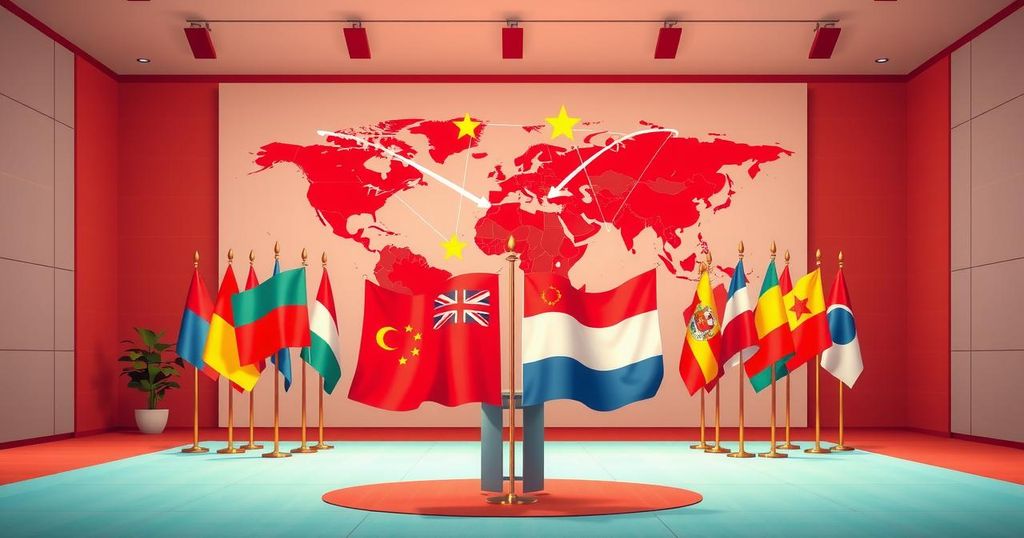BRICS Meeting in Brazil Challenges Trump’s Trade Policies Amid Global Concerns
BRICS foreign ministers convened in Rio de Janeiro to unite against Trump’s trade tariffs. The meeting is crucial as the IMF has cut growth forecasts, emphasizing multilateral dialogue amidst global crises. Key topics include U.S. tariffs on China and climate change, with Brazil poised to lead COP30 discussions this year.
The BRICS meeting in Rio de Janeiro has kicked off, with foreign ministers from Brazil, China, Russia, and other member nations pressing to present a collective stance against U.S. President Donald Trump’s trade policies. This two-day gathering comes at a pivotal time for the global economy, particularly following the International Monetary Fund’s recent downgrade of growth forecasts due to these tariffs.
Top diplomats from the bloc, which now includes members such as Egypt, Ethiopia, India, and South Africa, convened to craft a unified agenda ahead of the upcoming July summit. Brazilian Foreign Minister Mauro Vieira highlighted the necessity for dialogue amidst ongoing humanitarian crises and the threats to multilateralism. “BRICS’s role as a group is more important than ever,” he stated.
Since resuming office, Trump has imposed blanket tariffs of 10 percent on a multitude of nations and has introduced even heftier tariffs—up to 145 percent—on various Chinese goods. In retaliation, China has enacted its own tariffs, levying up to 125 percent on American products. Senior Chinese official, Zhao Chenxin, remarked that Beijing is on the “right side of history” against what he described as Washington’s “unilateralism and bullying.”
The BRICS coalition, established in 2009 by Brazil, Russia, India, and China, has broadened its influence significantly, now representing almost half the world’s population and 39 percent of global GDP. The group has touched on various sensitive issues, including the conflicts in Ukraine and Gaza. At the meeting’s onset, Vieira called for a complete withdrawal of Israeli forces from Gaza, labeling the current blockade as “unacceptable.”
As the United States gears up for a pivotal week affecting the Ukraine conflict, Trump’s recent dialogue with Ukrainian President Zelensky has seemingly shifted his tone towards Russian President Vladimir Putin. Putin’s subsequent announcement of a three-day ceasefire indicates volatile developments. The White House, however, remained skeptical about the ceasefire’s adequacy, reiterating Trump’s demand for a more enduring peace.
Additionally, BRICS is expected to challenge the dominance of the U.S. dollar in international trade discussions. Russian Foreign Minister Sergei Lavrov alluded to enhancing the use of national currencies among BRICS members but deemed talks of a unified BRICS currency as “premature.” Vieira also dismissed the idea of forming a new currency, noting Brazil’s relatively light tariff burden compared to the steep penalties faced by China.
Another pressing topic to emerge from this BRICS meeting will likely be climate change. Brazil is set to host the UN COP30 climate conference later this year in Belem, and this issue is expected to feature prominently in future discussions among member states.
The BRICS meeting in Brazil has turned into a significant forum for discussing global economic challenges primarily driven by Trump’s trade policies. As member countries unite to forge a collective response, issues of humanitarian crises, trade tariffs, and climate change dominate the agenda. The diplomatic efforts emphasize the importance of multilateralism as the group seeks to navigate the complexities of global trade while addressing pressing global crises, including the ongoing conflicts in Ukraine and Gaza.
Original Source: www.hindustantimes.com




Post Comment